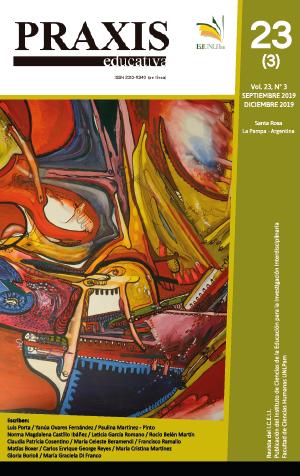Educación Inclusiva: Contradicciones, debates y resistencias / Inclusive Education: Contradictions, debates and resistance
DOI:
https://doi.org/10.19137/praxiseducativa-2019-230304Palavras-chave:
educación Inclusiva, discapacidad, derechos humanos, pedagogías latinoamericanas, prácticas educativas.Resumo
Se pretende presentar algunas consideraciones teóricas desde las cuales resulta conveniente fundamentar los planes o proyectos educativos a realizar en las escuelas de países latinoamericanos en el marco de la Educación Inclusiva, desde autores como Carlos Skliar, Rodolfo Stavenhagen y Paulo Freire. En cuyas propuestas pedagógicas, se destaca el carácter crítico y situado desde las realidades latinoamericanas y, en consecuencia, proponer una reflexión de las prácticas pedagógicas que nos lleve a redirigir el quehacer educativo hacia la materialización del derecho humano a la educación.Downloads
Referências
Ainscow, M. (2016). Desarrollo de escuelas inclusivas. Ideas, propuestas y experiencias para mejorar las instituciones escolares. Madrid:Narce.
Argüello Parra, A. (2012). La educación en derechos humanos como pedagogía de la alteridad. Cinco tesis a partir de la historia de vida de Rodolfo Stavenhagen. Revista Perfiles Educativos, (138), 148-166.
Argüello, A. (2011). Alteridad en la educación en derechos humanos. Un estudio biográfico de Rodolfo Stavenhagen. Revista Estudios pedagógicos, (1), 25 -34.
Echeita, G. y Ainscow, M. (2011). La educación como derecho. Marco de referencia y pautas de acción para el desarrollo de una revolución pendiente. Tejuelo, (12), 26-46.
Freire, Paulo. (1998). Pedagogía de la autonomía. México: Siglo XXI.
Marchesí, Á; Palacios J. Coll, C. (comp.)2017). Desarrollo psicológico y educación. Sevilla: Alianza.
Nosei, C. C. (2017). Carlos Skliar. Pedagogía de las diferencias. Noveduc: Perfiles. 2017, 214 páginas. Revista Praxis, (21), 65-67.
ONGD Salesiana. (s.f.).La educación como derecho humano fundamental. Progresos y reveses. Recuperado de https://www.jovenesydesarrollo.org/recursos-educativos/educaci%C3%B3n-como-derecho-humano-fundamental.
Parrilla Latas, Á. (2002). Acerca del origen y sentido de la educación inclusiva. Revista de Educación, (327), 11-30.
Sierra Lambraño, L. H. (s.f.).Paulo Freire y la pedagogía crítica. Recuperado de http://web.usbmed.edu.co/usbmed/CURSO_DOCENTE/PORTAFOLIO6/G6CAUCASIA_LUIS_SIERRA_INFORME_ANALISIS.pdf.
Silva, A. (1976). Paulo Freire: Una educación para la liberación. Revista de educación, (242), 87-96.
Skliar, C. (2005). Poner en tela de juicio la normalidad, ni la anormalidad. Políticas y falta de políticas en relación con las diferencias en educación. Revista Educación y pedagogía, (41), 11-22.
UNESCO. 2008. Conferencia Internacional de Educación. Cuadragésima octava reunión “La educación inclusiva: El camino hacia el futuro”. Ginebra. Recuperado de:http://www.ibe.unesco.org/fileadmin/user_upload/Policy_Dialogue/48th_ICE/CONFINTED_48-3_Spanish.pdf
Downloads
Publicado
Edição
Seção
Licença
Aviso de direitos autorais
Comitê Editorial Revista Práxis Educativa:
Declaro que sou o autor do artigo intitulado (nome do artigo), que o mesmo é original e de minha autoria e que não foi publicado anteriormente em qualquer outro formato ou meio. Declaro saber que a revista não me cobrará nenhum tipo de taxa em hipótese alguma, nem receberei qualquer tipo de remuneração monetária.
Caso seja aceito para publicação na Práxis Educacional, autorizo a referida revista a publicá-lo digitalmente e a divulgá-lo em suas redes sociais.
Se o trabalho for publicado, aderi à licença Creative Commons denominada "Atribuição - Compartilhamento Não Comercial pela mesma Licença CC BY-NC-SA", por meio da qual é permitido copiar, reproduzir, distribuir, comunicar publicamente o trabalho e gerar trabalhos derivados , desde que o autor original seja citado e reconhecido. Esta licença está em uso desde setembro de 2018. Em 2016 foi aderido ao CC BY NC ND 4.0; e nos anos de 2017 e 2018 (janeiro-agosto) CC BY NC 4.0.
Esta licença CC BY-NC-SA Share Alike não permite, entretanto, o uso comercial da obra. Como autor, a revista poderá estabelecer acordos adicionais para a distribuição não exclusiva da versão do trabalho publicado na revista, permite-me autoarquivar os artigos publicados, na sua versão post-print, em repositórios institucionais, temáticos , páginas web pessoais ou qualquer outro uso relevante. com o reconhecimento de ter sido publicado pela primeira vez nesta revista.
SA Práxis Educacional adere à DORA (Declaração sobre Avaliação de Pesquisa) assinada em São Francisco, Califórnia, em 16 de dezembro de 2012, e à Declaração do México (Declaração Conjunta LATINDEX - REDALYC - CLACSO - IBICT).















_(1)2.png)


3.png)











_(2).png)






2.jpg)









